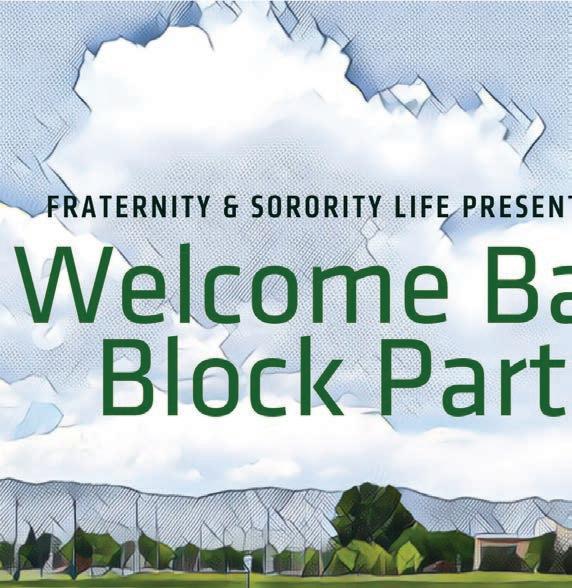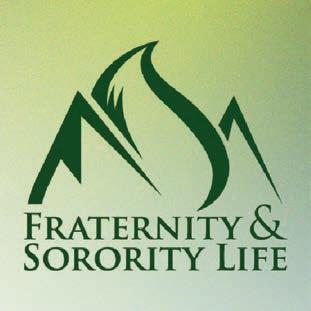




ELEVATE YOUR CSU EXPERIENCE
FRATERNITY & SORORITY

2024 | 2025

































































ELEVATE YOUR CSU EXPERIENCE

2024 | 2025



























































This guide gives interested students an overview of fraternities and sororities at CSU. With more than 45 fraternity and sorority chapters that vary in interest and membership, we believe a well-rounded involvement experience is waiting for you!
For more information, visit fsl.colostate.edu or come by our o ce in the Lory Student Center, Room 142.

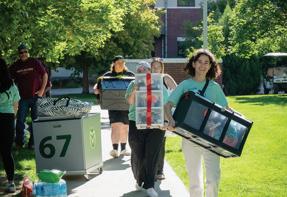

















There are many benefits to becoming a member of a fraternity or sorority. Among all organizations in the fraternity and sorority community, shared values inform the following benefits of membership.
Fraternities and sororities participate in various experiences that promote exploration of life passions and career readiness. Chapters report that over 51% of members are involved in at least one other student organization on campus, and 12% of members serve in a positional leadership role on campus!
Fraternity and sorority members are more likely to maintain a higher GPA and graduate on time compared to una liated students. Many fraternities and sororities o er study sessions, mentor programs, and scholastic accountability.
Check fsl.colostate.edu for community and chapter grade reports.
















A shared value among all fraternities and sororities is doing good in the community and engaging with social issues. Fraternities and sororities recognize the privilege and power of a college education and believe in giving back to their community.
In the past year the fraternity and sorority community contributed over $187,439 dollars to local and national charitable organizations and provided 81,481 hours of service to CSU and northern Colorado.
Approximately 2,600 students are members of fraternities and sororities at CSU, with chances to connect with other a liated students in the classroom, on the intramural fields, and across campus year-round.
Joining a fraternity or sorority is creating a home away from home; an opportunity to build a small community of brothers or sisters out of CSU’s large student population.














All fraternities and sororities have expectations of their members and potential members, and those expectations vary from chapter to chapter. Chapters should clearly communicate expectations to you before and after you join, so ask as many questions as you can!
All members of fraternities and sororities are, first and foremost, CSU students. Each chapter honors this reality with minimum GPA requirements to join and remain a member in good standing.
As representatives of individual chapters and the fraternity and sorority community, members of fraternities and sororities are expected to follow organizational, community, and CSU policies and guidelines.
Do your research: visit fsl.colostate.edu to view detailed information about each fraternity and sorority. This includes information about academic performance, organizational values, number of service hours completed, and organizational conduct history.















Tip: Ask the chapter(s) you’re interested in about expectations of membership before joining. All groups should be able to articulate their minimum requirements for members.
In fraternities and sororities, the time invested in the organization is largely up to the experience the individual member desires. Weekly meetings, chapter workshops, service activities, and social events are just some of the many ways members spend time in their organization.
Chapter dues can range from $200 to over a thousand dollars in a semester, and are determined by individual chapters. Higher dues for some organizations may be connected to live-in requirements (housing).
Detailed finance & facility information is available under the Future Members tab at fsl.colostate.edu


Fraternities and sororities have been present in the United States since the country’s founding in 1776.
Fraternities and sororities have been recognized at Colorado State University for over 100 years.
Greek-lettered organizations were created to help students on college campuses engage in lifelong learning and get involved outside of the classroom.
Fraternities and sororities o er opportunities that encourage values-based living and personal growth and development.
Some fraternities and sororities were created to center a specific culture, identity, interest, or professional focus. We refer to these organizations as interest and identity-specific chapters. 01 02 03 04 05 06
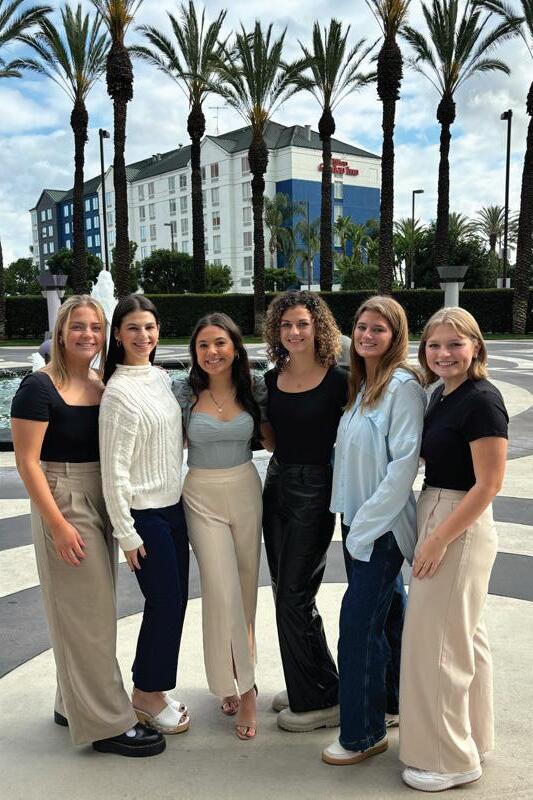

All organizations at CSU are either regional, national, or international in scope.




Some fraternities and sororities at CSU have facilities in which members live together, though most do not.
A U.S. government study shows that fraternity and sorority members are more likely to graduate than their counterparts who are not in fraternities and sororities. This is also true at CSU.
The first sorority was founded in 1867.
African American Greek letter organizations have been in existence since 1902.
07 08 09 10 11 12 13 14 15


The emergence of culturallybased fraternities and sororities occurred in 1975, centering Latinx, Asian, and multicultural experiences, among others.
There are about 2,600 fraternity and sorority members at CSU making up about 13% of the CSU undergraduate population.
The CSU fraternity and sorority community includes over 45 unique chapters.
Each chapter has important symbols and insignia.
Some organizations have performance traditions like stepping and strolling.

Fraternities and sororities develop leaders in the community and help students along their college journey. One of the most positive aspects of these organizations is the opportunity to connect with diverse individuals that challenge members to think di erently and gain new perspectives. At CSU there are a diverse array of interest and identityspecific fraternities and sororities in which students can unite with individuals connecting around a common interest, identity, or purpose.
Some of our chapters are focused in a particular area of study, including agriculture, business, engineering, and music. Some organizations center specific identities including faith/religion, culture, or race/ethnicity.
If your interests aren’t represented in your exploration of our fraternities and sororities, the opportunity to develop new organizations in fraternity and sorority life at CSU may interest you. Feel free to contact any sta member in the O ce of Fraternity and Sorority Life for more information.



















2,600 Members | 45 Chapters | 5 Councils | 1 Community
The Interfraternity Council is the governing council for men’s social fraternities. IFC includes 21 fraternities.
The Multicultural Greek Council is the home for culturally-based fraternities and sororities. There are currently five fraternities and six sororities.
The National Pan-Hellenic Council is the council for historically Black/ African-American fraternities and sororities. NPHC nationally is comprised of five fraternities and four sororities, and CSU’s NPHC currently recognizes three fraternities and two sororities.
The Panhellenic Association is the governing council for women’s social sororities. Panhellenic has 11 sororities.
The Professional Fraternity Council is the governing council for professionally focused and interest based fraternities and sororities. PFC has one all-gender fraternity, one fraternity, and two sororities.




The Interfraternity Council (IFC) is home to CSU’s social fraternities for men. As a community, IFC strives to promote and foster an environment that works toward a devotion to service, scholarship, leadership, and brotherhood. IFC’s aim is to create a prosperous environment in which men can grow and thrive throughout their collegiate experience.


For more information about how to join an IFC chapter, turn to page 31.
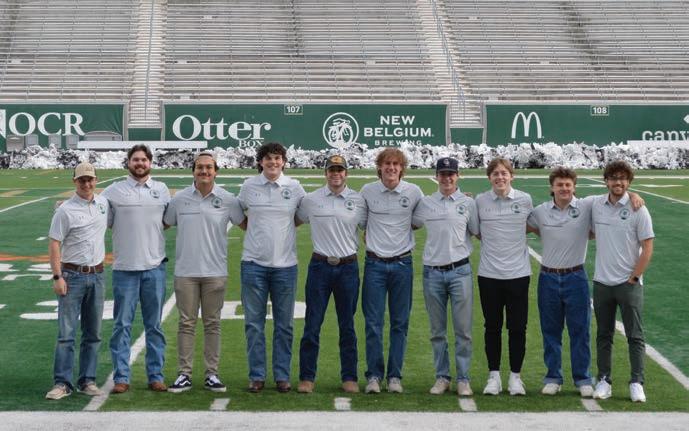

Alpha Sigma Phi
Alpha Tau Omega
Delta Tau Delta B
Beta Theta Pi
Delta Chi ΚΣ Kappa Sigma
Lambda Chi Alpha
Phi Delta Theta
Phi Gamma Delta
Sigma Phi Epsilon
Sigma Pi
Sigma Tau Gamma
Phi
Kappa Tau
Tau Kappa Epsilon
FarmHouse
Sigma Nu
Theta Chi
In IFC there are four interest-specific chapters (although membership is generally not confined to the interest, identity, or major).
Alpha Gamma Rho Agriculture
Phi Kappa Theta Catholic-Based
Nu Alpha Kappa Fraternity, Inc. Multicultural
Triangle Engineering, Architecture, and the Sciences
For more information about how to join an IFC chapter, including registering for recruitment , turn to page 31.
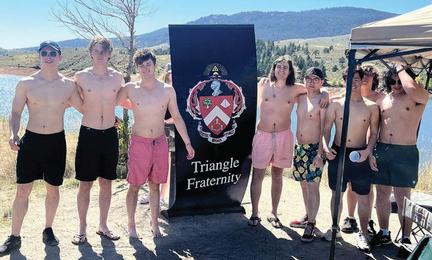







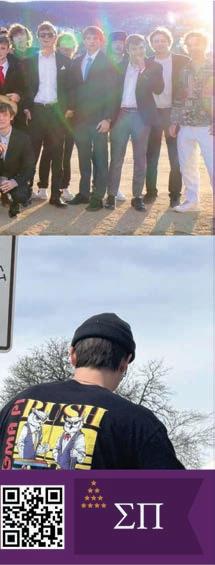

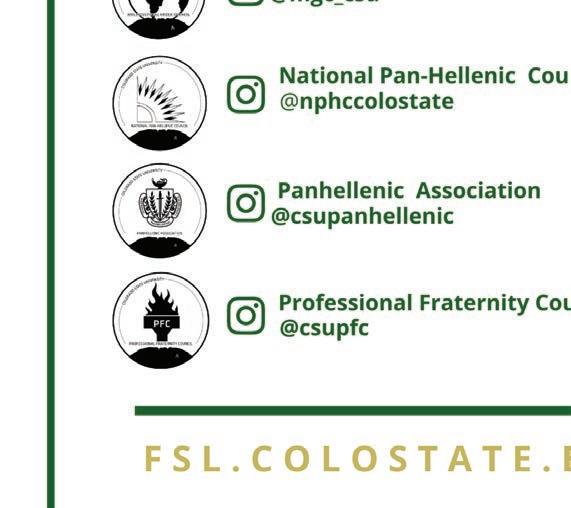



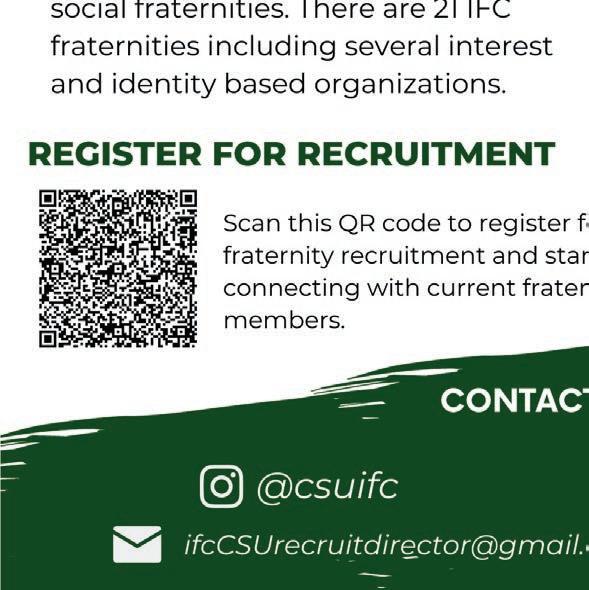

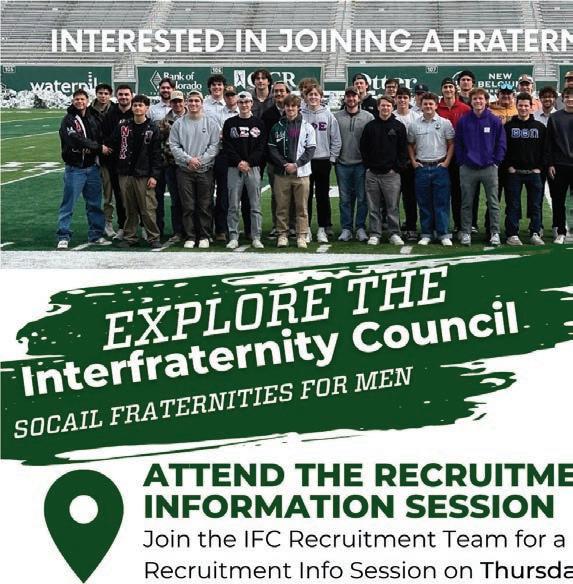

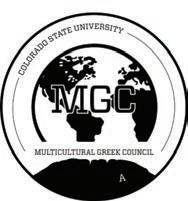
The Multicultural Greek Council is comprised of 11 culturally-based fraternities and sororities. Every member of the Multicultural Greek Council (MGC) takes tremendous pride in their organization. The MGC community embraces our cultural diversity and welcomes students of any identity.
MGC chapters center the experiences of Asian, Latino/a and multicultural identities and ancestries.
While our organizations are culturally based, anyone is welcome to join! We accept anyone into our community who is open to learning about other cultures and promoting diversity.
MGC envisions a community that values unity through diversity, empowerment from adversity, and opportunities for all.
To see us in action, check out the community calendar at http://fsl.colostate.edu/calendar for opportunities to engage with us. The best way to learn about us is to meet us. Stay on the lookout for our upcoming events!


For more information about how to join an MGC chapter, turn to page 32.
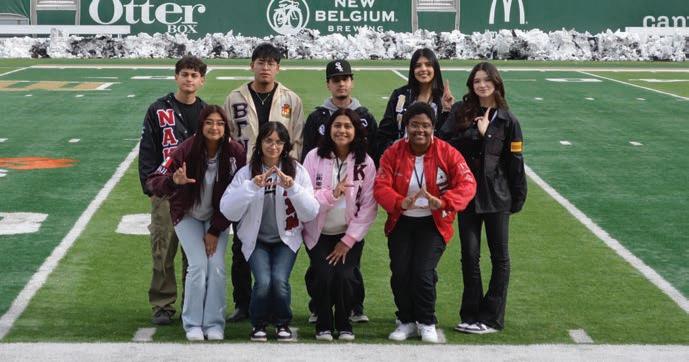
Alpha Phi Gamma National Sorority, Inc.
Beta Gamma Nu Fraternity, Inc.
Delta Xi Nu Multicultural Sorority, Inc.
Gamma Zeta Alpha Fraternity, Inc.
Kappa Delta Chi Sorority, Inc.
Lambda Sigma Upsilon Latino Fraternity, Inc.
Lambda Theta Nu Sorority, Inc.
Nu Alpha Kappa Fraternity, Inc.
Pi Lambda Chi Latina Sorority, Inc.
Sigma Lambda Gamma National Sorority, Inc.
Sigma Lambda Beta International Fraternity, Inc.

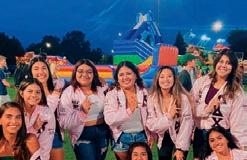












The National Pan-Hellenic Council, also known as NPHC, is the governing body for the historically Black fraternities and sororities on campus. On a national level, there are nine fraternities and sororities that comprise the National Pan-Hellenic Council. They are traditionally referred to as the “Divine Nine.” While the National Pan-Hellenic Council does not partake in a formal recruitment process every semester, students can still join an organization after the completion of their first year when an NPHC organization is conducting an intake process.
The National Pan-Hellenic Council promotes academic achievement, leadership development, health and wellness, and civic engagement. Organizations want to be an advocate for people who identify with or are in support of the African American community. NPHC organizations often collaborate with the Black/African American Cultural Center and its a liated student organizations on programs and events.


For more information about how to join an NPHC chapter, turn to page 33.
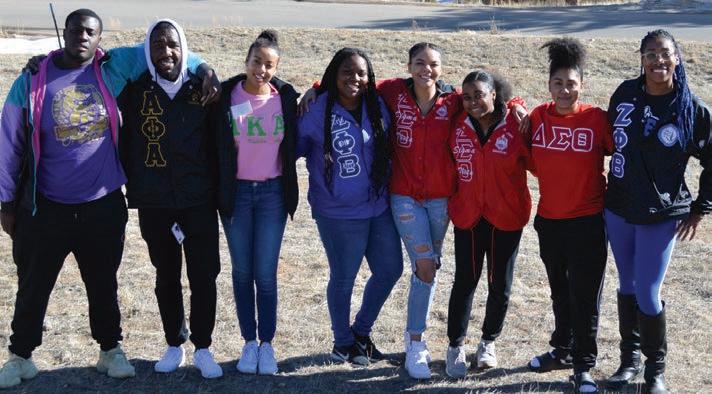
There are nine organizations in the National Pan-Hellenic Council. Those in bold are currently considered active by CSU.
• Alpha Phi Alpha Fraternity,Inc.
• Alpha Kappa Alpha Sorority, Inc.
• Kappa Alpha Psi Fraternity, Inc.
• Omega Psi Phi Fraternity,Inc.
• Delta Sigma Theta Sorority, Inc.
• Phi Beta Sigma Fraternity, Inc.
• Zeta Phi Beta Sorority, Inc.
• Sigma Gamma Rho Sorority, Inc.
• Iota Phi Theta Fraternity, Inc.
Check the fraternity and sorority life calendar and website at fsl.colostate.edu for upcoming NPHC events and additional information about the chapter and council.
Additionally, if you are interested in joining an organization that is not currently recognized by CSU, please come to the O ce of Fraternity and Sorority Life to speak with a sta member about how to get in touch with that organization.
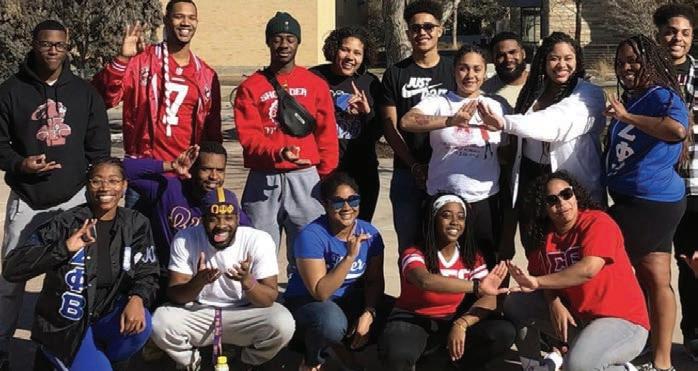

The Panhellenic Association, also known as PHA, is composed of eleven sororities, eight of which are member chapters of the National Panhellenic Conference. Three of the eleven chapters are considered interest or identity-specific chapters and are associate members of the council.
Members of Panhellenic chapters have the opportunity to experience standards of excellence in scholarship, service, and leadership. The Panhellenic Association is dedicated to providing meaningful experiences for its members including service opportunities, academic workshops and study groups, and positional leadership opportunities. All members are highly encouraged to join other organizations on campus. The community of Panhellenic members helps make the larger campus of CSU feel smaller. PHA creates a large network of highly intelligent, philanthropic, and dedicated members, intent on making life-long friendships and connections.


For more information about how to join a PHA chapter, turn to page 34.
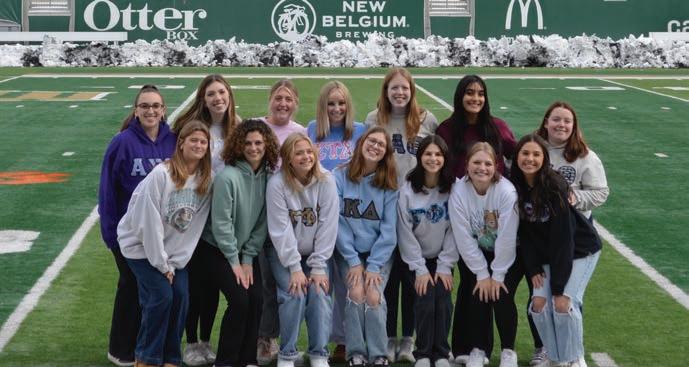
National Panhellenic Conference Chapters
ΧΩ Chi Omega
Kappa Kappa Gamma
Gamma Phi Beta
Kappa Alpha Theta
Kappa Delta
Phi Mu
Pi Beta Phi
Zeta Tau Alpha
Alpha Sigma Kappa
Women in Technical Studies (STEM)
Sigma Alpha Agriculture
Sigma Alpha Epsilon Pi Jewish
The National Panhellenic Conference chapters listed above all participate in primary recruitment (or “rush”). The associate chapters participate in a more informal recruitment process each semester.







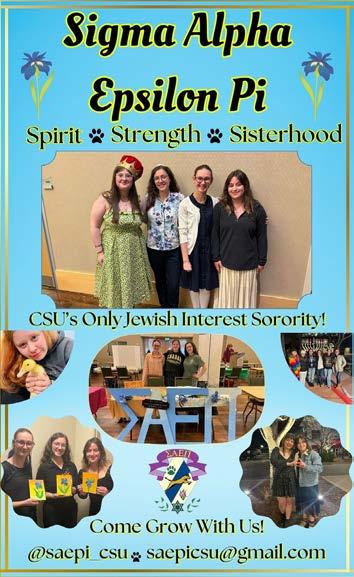




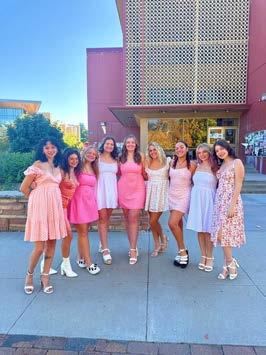





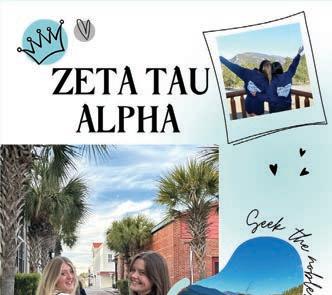



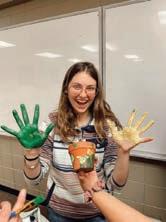
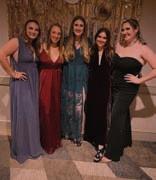






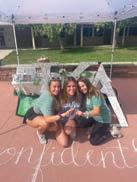


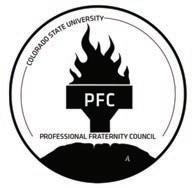
The Professional Fraternity Council, commonly known as PFC, exists to promote and enhance professional, service, and scholarly based fraternities and sororities at Colorado State University. Check the fraternity and sorority life calendar and website at www.fsl.colostate.edu for upcoming PFC events and additional information about individual chapter recruitment events.
Most PFC chapters host recruitment events each semester. It is important to note that most organizations in this council allow for dual membership, which means an individual may join both a social fraternity or sorority in one of the other four councils and be a member of a professional organization in PFC.


For more information about how to join a PFC chapter, turn to page 35.

Phi
It is important to note that Sigma Alpha holds dual membership with the Panhellenic Association (PHA) and the Professional Fraternity Council (PFC).

















Students interested in joining a fraternity or sorority should start by doing some research to determine the type of organization in which they are interested. Each organization o ers a di erent experience and may have additional requirements or expectations to join. Additional information is available at fsl.colostate.edu.


Visit our website: fsl.colostate.edu to complete the interested in joining form and learn more about our community.
While Interfraternity Council (IFC) fraternities encourage recruitment 365 days a year, chapters in this council host a more organized recruitment e ort in the first few weeks of each semester. A great way to learn more and get connected with an IFC fraternity is to register for IFC recruitment via the link at fsl.colostate.edu
Attend the Recruitment Info Session on August 29, 2024 at 5pm in Engineering 100 to learn more about fraternity recruitment. Please register for recruitment and view the recruitment calendar at: fsl.colostate.edu/future-members/council/join-interfraternity-council-ifc
To learn more about the IFC recruitment process and find a complete recruitment calendar view the Join the Interfraternity Council (IFC) page under the Future Members tab on the FSL website.








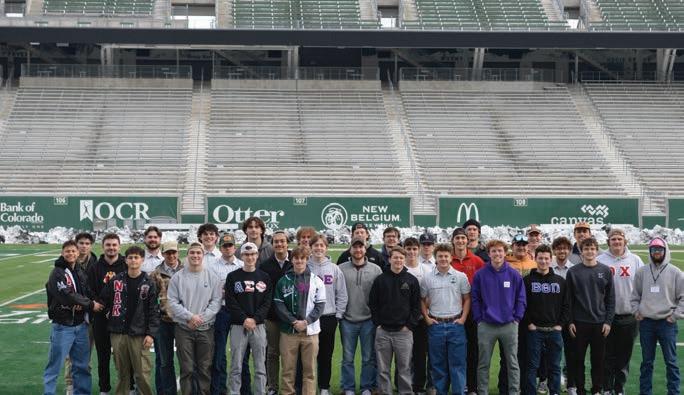
In the Multicultural Greek Council (MGC) students are often recruited by friends in a fraternity or sorority. Each organization generally hosts a week full of public events and informational meetings so that potential new members can learn more about the organization, meet members of the chapter, and see if that fraternity or sorority is a good fit. Some chapters require a certain amount of academic credits be completed before joining, and encourage joining after completing at least one semester at CSU (or another campus if a transfer student).
Join us at MGC’s Rooted in Culture on Friday, November 1, 2024 at 5:30pm in the LSC Theatre to learn more about joining the Multicultural Greek Council.
To learn more about the MGC recruitment/intake process view the Join the Multicultural Greek Council (MGC) page under the Future Members tab on the FSL website.




In the National Pan-Hellenic Council (NPHC), the process to join is a little more structured. Interested students are encouraged to do research about the organization they would like to join, whether they are currently active at CSU or not. NPHC chapters often require that candidates attend informational meetings, complete an application, attend a formal interview, and attend educational meetings.
The easiest way to get connected to one of these organizations is to reach out to the O ce of Fraternity and Sorority Life at CSU to learn about upcoming events and opportunities to express interest in NPHC organizations.




In the Panhellenic Association (PHA) there are two di erent types of recruitment. Eight chapters participate in a primary recruitment process (often called “rush”) held this year September 28-October 1, 2024
Primary recruitment is designed to introduce potential new members to all the chapters and for the sororities to learn more about each student. The three interest and identity-specific chapters of the Panhellenic Association hold informal recruitment e orts each semester that vary by chapter.
Students interested in primary recruitment need to register on the fraternity and sorority life website. More information about all types of Panhellenic recruitment is available at fsl.colostate.edu
To learn more about the PHA recruitment process view the Join the Panhellenic Association (PHA) page under the Future Members tab on the FSL Website.









Recruitment in the Professional Fraternity Council (PFC) varies from organization to organization. Each chapter generally hosts public events and informational meetings so potential new members can learn more about the organization, meet members of the chapter, and see if that fraternity or sorority is a good fit.
Some chapters require potential members to have a declared major in a particular field of study (for example agriculture or business), while other chapters welcome members from a variety of majors, but with a particular interest (like music). It is important to note that most PFC chapters allow members to have dual membership in sororities or fraternities from another council.
To learn more about the PFC recruitment process view the Join the Professional Fraternity Council (PFC) page under the Future Members tab on the FSL Website.



The CSU fraternity and sorority community believes that the experience of joining one of our organizations can be transformational and lead to significant personal growth and development. We share the values of our community so that anyone considering membership in a fraternity and sorority better understands the goals of the CSU fraternity/ sorority experience.
Our goal, to help students choosing to join a fraternity or sorority elevate their CSU experience and their own learning, led to the development of community values, otherwise known as “Climb.”
Learn more about the O ce of Fraternity & Sorority Life mission, Elevation: Ascend to greater heights, and our non-negotiable values at fsl.colostate.edu.































Change Agents: The OFSL will impart socially responsible leadership on fraternity and sorority members, focusing on doing good in the community, identifying root causes of social and systemic issues, recognizing and challenging inequities in society, and participating in an ever-growing and changing global society with the knowledge that individual actions matter.
L ifelong Learning & Critical Thinking: The OFSL will create experiences that encourage students to engage in lifelong learning, sound decision-making rooted in critical thought, and reflection on one’s interests and passions.
I
nclusivity & Social Justice: The OFSL will engage in the process and goal of change in the fraternal movement and the CSU fraternity and sorority community through integration of diverse perspectives, the elimination of oppression, and the personal investigation of identities and systems of injustice.
M
eaning-Making & Purpose: The OFSL will create opportunities for fraternity and sorority members to intentionally seek meaning from failures and successes to grow and develop as well as discover individual and organizational purpose to pursue a more authentic and congruent student experience.
B
uilding Coalitions and Connections: The OFSL will assist students in looking inward to one’s identity and wellbeing as a prelude to connection with others and provide experiences to ensure that friendship and fraternal bonds are filled with care, concern, and challenge to elevate the status quo. The OFSL will assist fraternity and sorority members as they seek healthy and diverse fellowship with members across chapters and councils, alumni/ae, Colorado State University, and the global community.
To make the decision to join a fraternity/sorority at Colorado State University is to make a commitment to better yourself and your community. Being involved as a fraternity/sorority member has the benefit of making a campus with thousands of students seem smaller, and the connections shared by our membership o ers a home away from home. Joining an organization can also open many doors to other opportunities such as potential leadership, connection to values, driven experiences, mentorship, and more!
Our fraternities and sororities are multifaceted in membership and structurally each one looks for members that are committed to the values and ideals of their organization. Some organizations o er specific experiential connections—areas of study, religious beliefs, and cultural a nity to name a few—and it is important to consider each organization and the way they recruit new members as you explore our community. We encourage all students interested in membership to fully explore the breadth of fraternity and sorority chapters to better understand organizational values, structures, and opportunities to identify an organization that is a good fit.
One of the benefits of fraternity and sorority membership is the professional and personal development opportunities that exist to help members cultivate important skills useful throughout one’s life. Fraternities and sororities can also provide access to a large alumni network that proves beneficial during and after college. Fraternities and sororities provide a learning laboratory for members to practice skills needed for whatever path a student chooses after college. Opportunities include holding leadership positions, developing networking skills, and participating in enriching personal experiences that provide opportunities for personal reflection and meaning making.
Each organization has di erent criteria for membership that always includes a GPA or academic expectation. Some organizations require students to be beyond their first semester as a student. We encourage students interested in joining to ask questions about membership eligibility as well as expectations for membership once they have joined an organization.
To view more FAQs, visit fsl.colostate.edu
